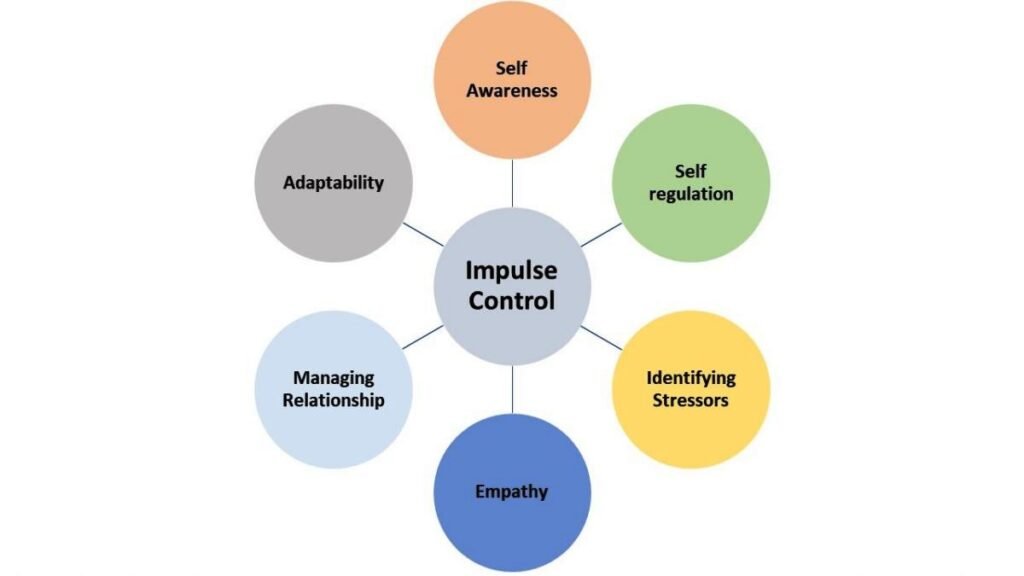Controlling Impulse and Mastering the Mind
Controlling impulses and mastering the mind are skills everyone can develop to grow, stay calm, and succeed. Impulse control means resisting sudden urges that might feel good now but hurt your goals later. Mastering your mind is about understanding and managing your thoughts and feelings so you stay focused and in control. Together, these skills help you live with purpose and make smarter choices. So, let’s discuss how to control impulses and master our minds.

The Role of Awareness To Control Impulse
The first step in controlling impulses is being aware of what’s happening in your mind. If you don’t know what sets off impulsive behavior, it’s hard to stop it. Being aware helps you:
- Spot Triggers: Notice the situations, feelings, or places that make you act without thinking.
- Pay Attention to Thoughts: Understand the thoughts that lead to impulsive actions.
- Stay in the Moment: Practice mindfulness so you don’t react automatically.
Simple habits like writing in a journal or meditating daily can make you more self-aware. Writing down how you feel and what caused those feelings can help you find patterns and choose better responses next time.
Managing Triggers to Control Impulse
Sometimes, controlling impulses means handling things that trigger them. These triggers might be your environment or even your emotions. Here’s how to manage them:
- Avoid Triggers: If shopping malls make you spend too much, try staying away from them.
- Replace Bad Habits: Do something positive instead, like going for a walk, reading, or calling a friend.
- Practice Waiting: Teach yourself to pause and think about what could happen if you act impulsively.
When you learn to manage your triggers, you’ll find it easier to stay in control.
Building Emotional Resilience to Control Impulses
Handling your emotions is a big part of mastering your mind. Strong feelings like anger, anxiety, or excitement often lead to impulsive decisions. Building emotional resilience helps you stay calm and make better choices. Here’s how:
- Practice Gratitude: Focus on what’s good in your life to stay positive and less reactive.
- Find Healthy Outlets: Activities like yoga, journaling, or spending time in nature can reduce stress.
- Talk It Out: Share your feelings with someone you trust, like a friend or family member, to work through them calmly.
Physical and Mental Health to Control Impulses
When your body and mind are healthy, it’s easier to control your impulses. Things like not getting enough sleep or eating poorly can make it harder to think clearly. To stay on track:
- Get Enough Sleep: Rest helps you think clearly and stay emotionally balanced.
- Eat Well: Avoid too much sugar or caffeine, as they can mess with your mood.
- Exercise Often: Working out boosts your mood and helps you handle stress better.
Taking care of yourself physically helps your mind stay strong and focused.
The Power of Time Management to Control Impulses
A busy, well-planned day leaves less time for acting on impulse. Managing your time wisely helps you stay disciplined. Try these tips:
- Make a Schedule: Plan your day, including breaks, to avoid feeling overwhelmed.
- Set Priorities: Focus on the most important tasks and avoid distractions.
- Use Tools: Apps or planners can help you stay organized and on track.
With good time management, you can stay focused on what matters and avoid getting sidetracked.
Financial Discipline to Control Impulses
Impulses often show up in how we spend money, like buying things we don’t need. Here’s how to stay in control of your finances and avoid impulsive buying:
- Make a Budget: Decide how much money goes to essentials, savings, and fun.
- Wait Before Buying: Follow the 24-hour rule to see if you really need something.
- Track Spending: Keep an eye on where your money goes so you can spot and stop wasteful habits.
Being careful with your money not only saves you cash but also gives you a sense of control and responsibility.
Strengthening Relationships to Control Impulses
Sometimes impulses can hurt our relationships, like saying something mean when we’re angry. To keep your relationships strong:
- Be Empathetic: Try to understand how the other person feels before reacting.
- Communicate Well: Use “I” statements to talk about how you feel without blaming others.
- Set Boundaries: Avoid situations that make you lose your cool.
Good relationships give you support and help you stay emotionally balanced.
Seeking Professional Guidance to Control Impulses
If you find it hard to control impulses or your emotions, getting help from a professional can make a big difference. Therapists and counselors can teach you personalized strategies. For example, Cognitive Behavioral Therapy (CBT) can help you spot and change thought patterns that lead to impulsive actions.
Conclusion
Controlling impulses and mastering your mind take time and effort, but it’s worth it. Start by becoming more self-aware, managing your triggers, and taking care of your physical and mental health. Good time management, financial discipline, and healthy relationships also play a big role. If needed, don’t hesitate to seek professional help. Remember, mastering your mind is a journey that begins with small, consistent steps every day. Over time, these efforts will help you live a more intentional and fulfilling life.
